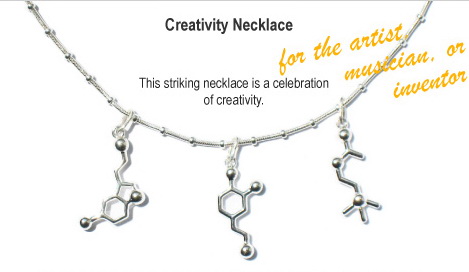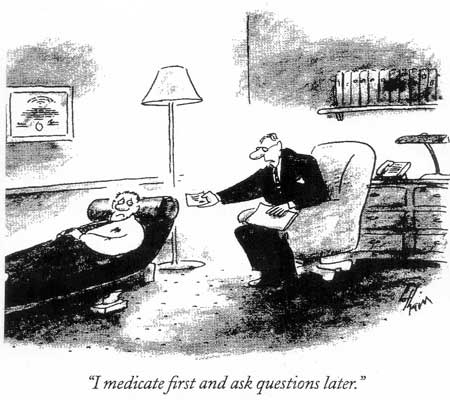Gag me with a spoon.
Psychiatric diagnosis is never a controversy. It is always a mess.
Within the first week of my residency training, my respected preceptor in child psychiatry told me “You aren’t going to child psych very much, Estelle. There isn’t much evidence for most of what we do. The research is about 20 years behind adult psychiatry.” Read more on The Alleged Controversy About Childhood Bipolar Illness…
Filed under Mental Illness, News, Psychiatrists by on Apr 6th, 2018. Comment. ![]()
I recently had a patient who walked in to see me wearing a vintage Dior suit. I complimented her, of course, as I think that an ideal way to dress. She presented as powerful, and in control of her life.
She looked me straight in the eye, as if she were delivering me a deep and secret truth. Read more on Useless Phase For Today: “Chemical Imbalance”…
I find a lot of things I like in the New York Times. This article resonated with me as few others. First, there is the purpose of the human profiled. Changing medicine into data science? God save us all.
Sometimes I feel the best thing I do for a patient is to be human. Just to have the pretension (a pretension which I do not take lightly) of being one human being in a room with another human being, trying to make them feel better. This does more, I think, to make most of my patients “better” than all of the pills I have spent years studying about. All those years studying normative use of medications on large populations of humans. And they work enough to please the powers that be.
Filed under medicine, News, Psychology, Research by on Jul 3rd, 2017. Comment. ![]()
By now I think folks on the business management level of health care are at least aware that we Americans spend a lot of money on health care and seem to get very little in return. The author of a provocative piece in Forbes thinks “unnecessary health care” is our worst problem. This statement hit me broadside. This does seem pretty true for the example she chose, even though it is decidedly outside of my field.
As far as I can figure, this sort of planned emergency delivery she talks about brings nothing to obstetric science or to the quality of human life whatsoever. Around the net, I see estimates of how much of what we do is actually science. It usually comes out as about 50 or 60%; maybe a little over half. This is happening as part of what seems to be a massive drive towards EBM, known as “Evidence Based Medicine.”
Filed under Government, Healthcare reform, News, Psychiatrists by on Jun 12th, 2017. Comment. ![]()
Why can’t science be fun?
I mean, sure – I’d love to see cancer cures, and schizophrenia cures and even more on the promising telomeric theory of living forever. But sometimes, we learn a lot of things that seem – if not useless, then inconsequential –and they prove invaluable later on in ways we can never predict.
Would you like to know in advance if a pop song is going to be a big hit? I’m sure some people would. Believe it or not, that has been the topic of recent research. Okay, so it is a small study. Who would fund further research on this one? There is a certain part of the tender adolescent brain (remember, our brains don’t get completely myelinated until age 28. That means we do not have all the fatty-insulation around the nerves to conduct impulses) that reacts in a very interesting way to music. Based mostly on animal studies, the ventral striatum seems to be associated with emotions that generate behavior. This differentiates it from the dorsal striatum, which has mostly sensorimotor control. Makes sense. Although they are similar, these two different types of behavior are slightly different. Sometimes we decide what we want to do by what we feel physically. If it is too cold, we go for a jacket. The sensory input probably goes through at least a couple of brain centers, like thermoregulation. Read more on Using Science To Predict Pop Music Hits…
Filed under Brain, Research, Science by on Jul 13th, 2011. Comment. ![]()
If I had to pick a favorite neurotransmitter, I would have to pick acetylcholine (ACh). As a matter of fact, I did. I ordered a custom-made necklace featuring my three favorite neurotransmitters – and ACh was the first in line.
The others? Well, since you are interested — dopamine and serotonin. And I always wear this necklace, these days.
Some ancient cultures have worshipped the herb rosemary as a symbol of memory. Me, I much prefer the molecule at my neck which, in addition to its well-known role at the neuromuscular end plate, where it translates neural impulses into motor contraction, is also essential for memory.
That teensy little nucleus basalis of Meynert, which looked kind of blue-gray when last I saw it on the front of a cadaver’s brainstem – and pretty faded when Alzheimer’s is present– has gone and given up a few of its secrets.
Let’s go to an epidemiologic mess, such as Attention deficit hyperactivity disorder (ADHD), and all of its subtypes and such, most of which I think are artifacts and do not exist — although (mostly untrained) adults often attribute them to children who annoy them.
A lot of these kids have anticholinerases (read: organophosphates ), originally meant for insecticides and Nazi nerve gases, inside them. Same with people with Alzheimer’s.
So I’m not just some “know-it-all” – I’m a one-woman ACh fan club. And this I swear on whatever Holy document you wish – I even dressed up as a Choline molecule TWICE for Halloween. Once before I met my husband, and then again – because he wanted to see how cuddly a molecule could look –- again a few years ago. He called me his “Choline Cutie.”
Of course, I was not built to scale – being somewhere near 300 lbs. when I dressed that way. But the placement of the atoms was absolutely perfect.
ACh was the first neurotransmitter discovered – back in the 1920s — so I think it is about time it got recognition.
Anyone want to join the fan club?
Filed under Memory by on Jun 17th, 2011. 2 Comments. ![]()
I looked at her, better dressed than most of the folks at the clinic where she was seen, with an open mouth. I had to take a few extra minutes to figure out what I was going to say next. In case you have not guessed, that is pretty far from my usual state.
“I have a chemical imbalance,” she said. She looked a little like Sharon Osbourne, hip and trendy but expensively dressed. “He gave me some medicines that really helped, like Xanax and Ativan, and either of those would be just fine.”
I freely admit that psychiatric diagnosis and treatment have a long way to go to meet either the organic precision of the surgical specialties or the subjective enthusiasm of the non-prescribing mental health professionals, such as psychologists or psychotherapists. But there are practitioners out there who are either so indifferent or so pressured that they rattle off words without meaning and give prescriptions that hinder more than help.
Filed under Diagnosis by on Jan 12th, 2010. Comment. ![]()

